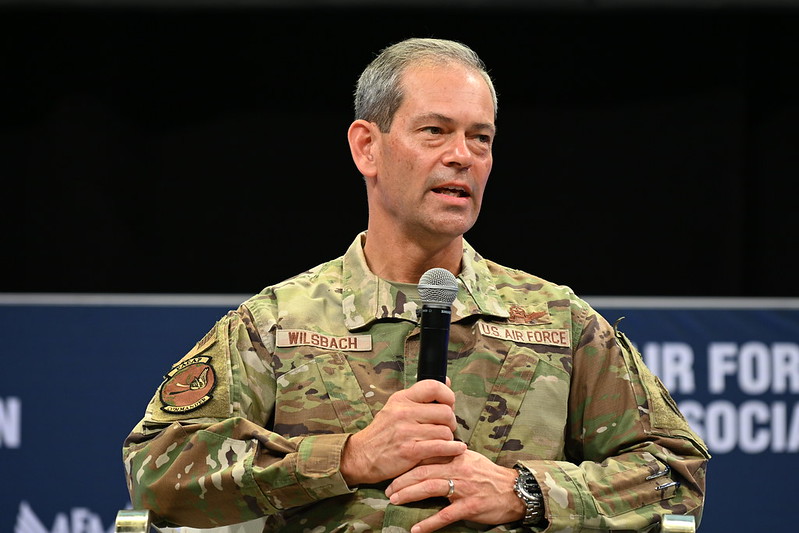As the world watches Russia in Eastern Europe, concerns are rising that China could find opportunity in crisis when it comes to Taiwan and the South China Sea, Pacific Air Forces commander Gen. Kenneth S. Wilsbach said March 3 at the AFA Warfare Symposium in Orlando, Fla.
“I’m watching them like a hawk,” Wilsbach said at a media roundtable, noting the Chinese could see the crisis as “dangerous” while also acknowledging “there might be an opportunity here.”
He said he hopes global condemnation of Russia’s actions in Ukraine will deter China but that PACAF still needs to be ready to deter and fight. This includes everything from improving agile combat employment operations to upgrading detection and the fifth-generation weapons systems of allies.
“The first thing that I need is a way to establish and maintain air superiority,” Wilsbach said.
Enhancing U.S. capability in the air-to-air fight includes the ability to reach support aircraft with fifth-generation weapons systems, he said. It also “means stealthy capabilities, and extending a long-range kill chain, and … breaking the long-range kill chain of the adversary,” he said. Fifth-generation weapons and tracking capabilities that can reach an excess of 200 miles are needed, and Wilsbach wants to see policies lifted that limit the selling of the latest weapons technologies to allies.
The replacement for the E-3 Sentry AWACS is one focus area for the commander, who supports a move to the E-7 used by Australia, South Korea, and soon, Great Britain, for better detection and tracking of airborne moving targets.
“The E-3 is challenged with maintenance, reliability. But once it even gets airborne, it can’t see that far out, especially when you start talking about stealthy platforms,” he said. “The E-7 gives us a very quick capability.”
America’s European allies are increasing their participation in the Pacific “as a result of the nefarious activities that they’re seeing China execute over time that could be impacting their interest in the Pacific,” Wilsbach said.
Germany is one of the countries increasing its participation in Indo-Pacific exercises following the release of its own Indo-Pacific strategy in September 2020.
“This is the whole government comprehensive approach, because a lot of our trade [is] going into this region,” German air attache Brig. Gen. Frank Graffe told Air Force Magazine at an AWS pull-aside interview.
“We enforce the free and open Indo-Pacific with this strategy,” he said. “This year, we will send Eurofighter to Australia, Singapore, South Korea, and Japan.”
Graffe said Germany will also deploy its A330 MRTT refueler and A400M transport aircraft to the theater.
Wilsbach commended Great Britain’s sailing of the Queen Elizabeth II aircraft carrier in Indo-Pacific waters, even though it roiled the Chinese, and he called on the French to increase their presence in the region.
“You see the value of having like-minded nations coming together in mass and acting with solidarity to create effects,” he said. “We see information effects. We see political effects. We see economic effects. We see defense and weapons effects.”
The PACAF commander said the same could be done in the Indo-Pacific to mount pressure on the Chinese modus operandi.
“It bothers them because we’re challenging their claims,” he said. “We are challenging the Chinese way of doing business versus the accepted international rules-based order. That’s why they don’t like it. Because we’re challenging their illegal assertions.”
